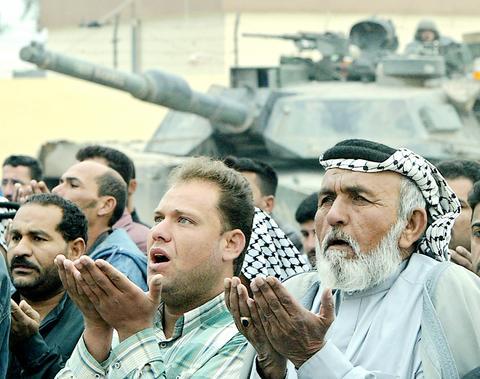Iraq's interim authority has submitted a timetable for self-rule and asked the UN Security Council for a new resolution that would end the US-led occupation in June.
Security on the ground in Iraq was intense as troops went on alert for attacks marking the end of the Muslim holy month of Ramadan after the grisly weekend killings of US soldiers.

PHOTO: REUTERS
In a letter to the Security Council on Monday, Jalal Talabani, president of the Iraqi Governing Council, promised to establish the "principle of civilian control over the Iraqi armed and security forces."
The US-appointed council said it would select a "provisional legislative body" no later than May 31 next year, which would elect a provisional government by the end of June.
Then "the Coalition Provisional Authority will be dissolved and the occupation ... will end," Talabani's letter said.
The future of their country was on the minds of Iraqis as thousands of Muslims gathered at Baghdad's Abu Hanifa mosque, one of Sunni Islam's holiest shrines, to pray and participate in the Eid al-Fitr, the celebration that marks the end of a month of dawn-to-dusk fasting.
"I don't think of this as Eid. If the Americans left and there was a new government, with law and order, then every day would be Eid," said Abdel Wadoud Doukhi as he left the mosque.
US military helicopters clattered low overhead, keeping watch following several small explosions earlier in the day and after three US soldiers were killed in two attacks on Sunday.
Since Washington declared major combat in Iraq over on May 1, 185 soldiers have died in action. Washington blames the attacks on insurgents loyal to toppled leader Saddam Hussein.
US President George W. Bush met families of some of the fallen soldiers during a visit to a Colorado army base and vowed to answer the attacks with more force.
"We're sending a clear message: Anyone who seeks to harm our soldiers can know that our great soldiers are hunting for them," Bush told troops and families at Fort Carson on Monday.
On Sunday, witnesses said two US soldiers were shot in the northern city of Mosul, before being dragged from their car in broad daylight and beaten and stabbed by an angry crowd.
Another soldier was killed on Sunday by a roadside bomb near the town of Baquba, 65km north of Baghdad.
The Governing Council's timetable, worked out with US and British officials, had been due on Dec. 15 but arrived three weeks early. It was requested in an October Security Council resolution, which created the multinational force in Iraq.
"... it has become appropriate for the Security Council to adopt a new resolution taking into consideration the new circumstances," Talabani wrote.
The US and Britain are considering a new resolution that would welcome or endorse the accelerated timetable, which Washington had opposed in October.
But faced with the mounting death toll, the Bush administration switched positions this month and decided to speed up a transfer of power.
Also See Story:
Security concern in Iraq shifting to local officials

DAREDEVIL: Honnold said it had always been a dream of his to climb Taipei 101, while a Netflix producer said the skyscraper was ‘a real icon of this country’ US climber Alex Honnold yesterday took on Taiwan’s tallest building, becoming the first person to scale Taipei 101 without a rope, harness or safety net. Hundreds of spectators gathered at the base of the 101-story skyscraper to watch Honnold, 40, embark on his daredevil feat, which was also broadcast live on Netflix. Dressed in a red T-shirt and yellow custom-made climbing shoes, Honnold swiftly moved up the southeast face of the glass and steel building. At one point, he stepped onto a platform midway up to wave down at fans and onlookers who were taking photos. People watching from inside

A Vietnamese migrant worker yesterday won NT$12 million (US$379,627) on a Lunar New Year scratch card in Kaohsiung as part of Taiwan Lottery Co’s (台灣彩券) “NT$12 Million Grand Fortune” (1200萬大吉利) game. The man was the first top-prize winner of the new game launched on Jan. 6 to mark the Lunar New Year. Three Vietnamese migrant workers visited a Taiwan Lottery shop on Xinyue Street in Kaohsiung’s Gangshan District (崗山), a store representative said. The player bought multiple tickets and, after winning nothing, held the final lottery ticket in one hand and rubbed the store’s statue of the Maitreya Buddha’s belly with the other,

‘NATO-PLUS’: ‘Our strategic partners in the Indo-Pacific are facing increasing aggression by the Chinese Communist Party,’ US Representative Rob Wittman said The US House of Representatives on Monday released its version of the Consolidated Appropriations Act, which includes US$1.15 billion to support security cooperation with Taiwan. The omnibus act, covering US$1.2 trillion of spending, allocates US$1 billion for the Taiwan Security Cooperation Initiative, as well as US$150 million for the replacement of defense articles and reimbursement of defense services provided to Taiwan. The fund allocations were based on the US National Defense Authorization Act for fiscal 2026 that was passed by the US Congress last month and authorized up to US$1 billion to the US Defense Security Cooperation Agency in support of the

‘COMMITTED TO DETERRENCE’: Washington would stand by its allies, but it can only help as much as countries help themselves, Raymond Greene said The US is committed to deterrence in the first island chain, but it should not bear the burden alone, as “freedom is not free,” American Institute in Taiwan Director Raymond Greene said in a speech at the Institute for National Defense and Security Research’s “Strengthening Resilience: Defense as the Engine of Development” seminar in Taipei yesterday. In the speech, titled “Investing Together and a Secure and Prosperous Future,” Greene highlighted the contributions of US President Donald Trump’s administration to Taiwan’s defense efforts, including the establishment of supply chains for drones and autonomous systems, offers of security assistance and the expansion of